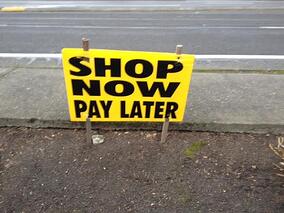When you have too many credit accounts and cannot meet the minimum payments required, then it may be time for you to consider a DEBT SETTLEMENT PROGRAM.

There are many reasons a financially stressful situation like this can happen, but some of the most common are:
- Loss of employment or layoff
- Too little income in retirement
- Unexpected medical bills
- Increasing cost of medications
- Divorce
- Disability
- Loss of spouse or partner
These are just some of life experiences that can financial hardship.
If one or more of these sounds like what you are going through, you may have several options:
If you have enough equity in your home, a refinance or equity line of credit may be a solution.
If you qualify for a consolidation loan or balance transfer and the interest rate is not too outrageous, then that may work.
You may qualify for a Credit Counseling or Debt Management Program. But if you are having a hard time keeping up with the total due for all of the minimum payments now, most likely this type of program will not help.
What about BANKRUPTCY?
I believe bankruptcy can be a viable option if you have tried all other options. Bankruptcy laws have changed over the last few years to prevent someone from trying to use bankruptcy to discharge debt when they possibly could meet their promised to repay!
So how does a DEBT SETTLEMENT PROGRAM work?
If you have missed a couple of months of making the minimum required payment due on all of your accounts or cards, they are probably getting close to being "charged off".
When this happens, the account will most likely be transferred or sold to a third party debt collector or debt purchasing company.
Most people are not aware that there is a multi-million (or most likely) billion dollar industry that purchases old, delinquent debt for pennies on-the-dollar for collection!
Let's say you have a credit card and due to circumstances beyond your control you just cannot make the payments.
The original creditor will call and send letters trying to get you to start making payments again. But after 3-4 months, the account lands with a Debt Collector.
Now the Debt Collector starts calling, and calling, and calling.....
The good news is that now you can put a stop to those annoying calls!
These letters will try to get you to pay or in some cases, they may offer to SETTLE THE ACCOUNT for less than the balance due!
This offer may be anywhere from a small reduction or possibly a very good reduction.
You may also be able to contact the debt collector to NEGOTIATE a better settlement or perhaps to let you take advantage of the settlement offer by making a series of monthly payments that you can afford.
Negotiating with debt collectors can be very time consuming and stressful.
I've been helping people deal with the stress of too much debt and negotiating with debt collectors (many time attorneys) for many years, so I know from personal experience!
The agent for the debt collector's job is to get as much money out of you as possible! In many cases, their income, commission or bonus depends on being very inflexible.
The agent will try to intimidate you and in many cases try to shame you into getting you to pay back all of the balance!
There are laws that protect consumers from illegal collection tactics, but most people are not aware of them.
I've written several articles about dealing with debt collectors. Here's one that may be especially helpful:
Debt Collectors, the FDCPA and Your Rights
For the sake of this blog, let's say that you negotiate a settlement for less than the balance due...NOW WHAT?
DO NOT, I repeat, DO NOT make any payment (by phone or mail) without a WRITTEN SETTLEMENT AGREEMENT!
A settlement agreement is basically a modified contract from the original contract (application) you signed when you took out the card or loan.
If the agent will not email, fax or mail the written agreement, then no settlement/no payment....PERIOD! It is your only proof of payment once the agreement is completed.
Here is link to what a settlement agreement looks like:
Once the settlement agreement is completed, you can request a letter or statement showing a $0 balance, but if they will not comply, then your cancelled check or bank statement showing payment along with the settlement agreement will suffice.
Over time, you can get yourself back to being DEBT FREE!
If all of this sounds like a little too much for you to handle, let us know:







 If you find yourself with too much debt and not enough money to keep up with at least the minimum payments, a debt settlement program may just be what you need to get a fresh start!
If you find yourself with too much debt and not enough money to keep up with at least the minimum payments, a debt settlement program may just be what you need to get a fresh start!









